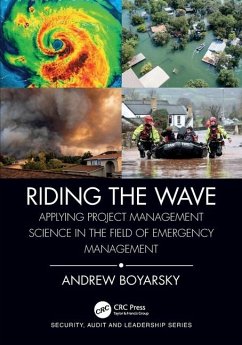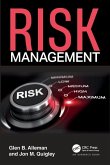Emergency managers and public safety professionals are more frequently being called on to address increasingly challenging and complex critical incidents, with a wider variety and intensity of hazards, threats, and community vulnerabilities. Much of the work that falls into the scope of emergency managers - prevention, preparedness, mitigation - is "blue sky planning" and can be contained and effectively managed within projects. This book provides a foundational project management methodology relevant to emergency management practice, and explains and demonstrates how project management can be applied in the context of emergency and public safety organizations.
Special features include:
an initial focus on risk assessment and identification of mitigation and response planning measures;a clear set of better practices, using a diverse set of examples relevant to today's emergency environment, from projects to develop emergency response exercises to application development to hazard mitigation;a framework for managing projects at a strategic level and how to incorporate this into an organization's program, and presents how to develop and manage an emergency program and project portfolio; andsuitability as both a hands-on training guide for emergency management programs and a textbook for academic emergency management programs.
This book is intended for emergency managers and public safety professionals who are responsible for developing emergency programs and plans, including training courses, job aids, computer applications and new technology, developing exercises, and for implementing these plans and components in response to an emergency event. This audience includes managers in emergency and first response functions such as fire protection, law enforcement and public safety, emergency medical services, public health and healthcare, sanitation, public works, business continuity managers, crisis managers, and all managers in emergency support functions as described by FEMA. This would include those who have responsibility for emergency management functions, even without the related title.
Special features include:
an initial focus on risk assessment and identification of mitigation and response planning measures;a clear set of better practices, using a diverse set of examples relevant to today's emergency environment, from projects to develop emergency response exercises to application development to hazard mitigation;a framework for managing projects at a strategic level and how to incorporate this into an organization's program, and presents how to develop and manage an emergency program and project portfolio; andsuitability as both a hands-on training guide for emergency management programs and a textbook for academic emergency management programs.
This book is intended for emergency managers and public safety professionals who are responsible for developing emergency programs and plans, including training courses, job aids, computer applications and new technology, developing exercises, and for implementing these plans and components in response to an emergency event. This audience includes managers in emergency and first response functions such as fire protection, law enforcement and public safety, emergency medical services, public health and healthcare, sanitation, public works, business continuity managers, crisis managers, and all managers in emergency support functions as described by FEMA. This would include those who have responsibility for emergency management functions, even without the related title.
"In today's ever-evolving landscape of crises and emergencies, Andrew Boyarsky's book, Riding the Wave: Applying Project Management Science in the Field of Emergency Management, offers a refreshing and timely exploration of how the strategic principles of project management can be applied to emergency response. Drawing from three decades of experience and a rich tapestry of real-life scenarios, Boyarsky makes a compelling case for a more structured, project-centric approach to emergencies.
In essence, this book is more than just a guidebook; it's a clarion call for a paradigm shift in approaching crises. While the book is academically rigorous, Boyarsky's engaging style ensures it's never dry. The real-world examples, stemming from his vast experience, bring the concepts to life, making them relatable and actionable. Whether you're an emergency management veteran, a project manager looking to diversify your skill set, or just a curious reader eager to understand the evolving nature of crisis response in our complex world, this book is essential."
-Todd T. DeVoe, MPA, CEM®, Host of The Emergency Management Network Podcast; Adjunct Professor of Emergency Management at the University of California, Irvine; Contributing author of the book Campus Crisis Management, a Comprehensive Guide for Practitioners
"This book is a monumental achievement and an important contribution to the profession of emergency management. At it's core, emergency management is project management (I call it "extreme" project management), and this book guides the practitioner to mastery of those critical skills that create order out of an increasingly chaotic world. It is an essential tool in every emergency management and public safety toolbox."
-Kelly McKinney, AVP, Emergency Management + Enterprise Resilience, NYU Langone Medical Center; Author of Moment of Truth: The Nature of Catastrophes and How to Prepare for Them
"The topic of project management is in many ways the critical skill for emergency managers. Its tenets cut across all phases of emergency management, and its benefits can save dollars, speed results, and avoid costly failures. As the emergency management profession transitions to a footing of managing overlapping and compounding events, the project management competencies are quickly moving from "nice to have" to "essential." Riding the Wave is a valuable addition to the literature and should find a home among students, consultants, and emergency managers.
-Charles R. Jennings, PhD, Director of the Christian Regenhard Center for Emergency Response Studies (RaCERS) at John Jay College of Criminal Justice, City University of New York
In essence, this book is more than just a guidebook; it's a clarion call for a paradigm shift in approaching crises. While the book is academically rigorous, Boyarsky's engaging style ensures it's never dry. The real-world examples, stemming from his vast experience, bring the concepts to life, making them relatable and actionable. Whether you're an emergency management veteran, a project manager looking to diversify your skill set, or just a curious reader eager to understand the evolving nature of crisis response in our complex world, this book is essential."
-Todd T. DeVoe, MPA, CEM®, Host of The Emergency Management Network Podcast; Adjunct Professor of Emergency Management at the University of California, Irvine; Contributing author of the book Campus Crisis Management, a Comprehensive Guide for Practitioners
"This book is a monumental achievement and an important contribution to the profession of emergency management. At it's core, emergency management is project management (I call it "extreme" project management), and this book guides the practitioner to mastery of those critical skills that create order out of an increasingly chaotic world. It is an essential tool in every emergency management and public safety toolbox."
-Kelly McKinney, AVP, Emergency Management + Enterprise Resilience, NYU Langone Medical Center; Author of Moment of Truth: The Nature of Catastrophes and How to Prepare for Them
"The topic of project management is in many ways the critical skill for emergency managers. Its tenets cut across all phases of emergency management, and its benefits can save dollars, speed results, and avoid costly failures. As the emergency management profession transitions to a footing of managing overlapping and compounding events, the project management competencies are quickly moving from "nice to have" to "essential." Riding the Wave is a valuable addition to the literature and should find a home among students, consultants, and emergency managers.
-Charles R. Jennings, PhD, Director of the Christian Regenhard Center for Emergency Response Studies (RaCERS) at John Jay College of Criminal Justice, City University of New York








